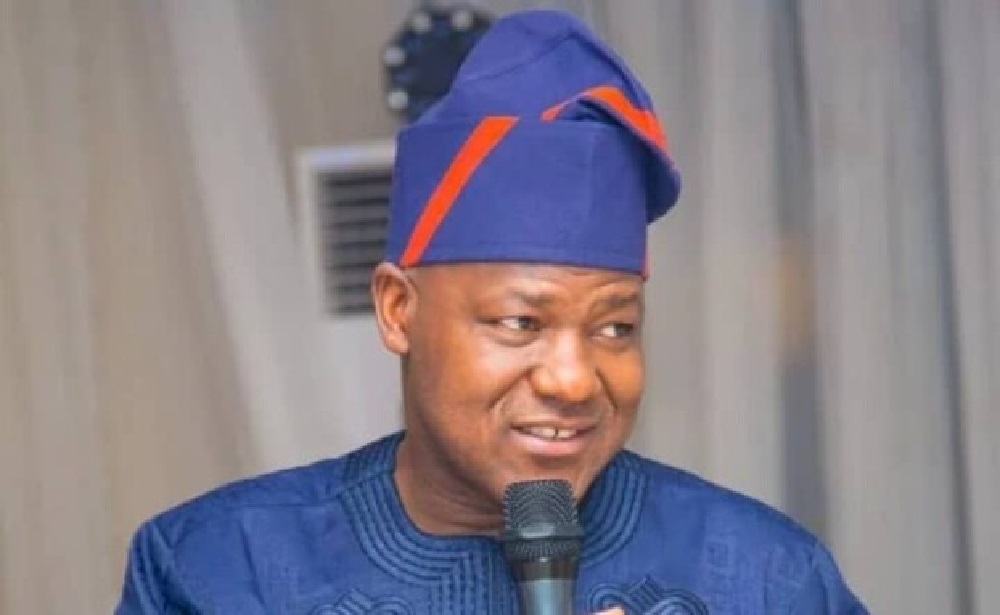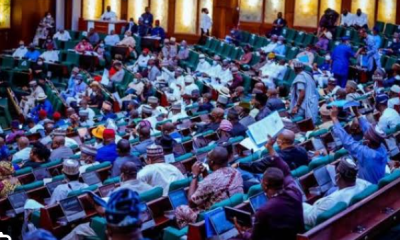News
Secession: Nigeria didn’t learn from civil war, says Dogara

Former Speaker of the House of Representatives, Yakubu Dogara, has expressed concern that Nigeria has not learned from the lessons of its Civil War, as evidenced by the rise of secessionist movements in the country.
In his keynote address at the World Interfaith Harmony Week Conference and Awards, held at the Trenchard Hall, University of Ibadan, Oyo State, Dogara noted that the lack of effective nation-building since independence has led to the emergence of groups advocating for secession.
Dogara, who was represented by Timothy Golu, remarked, “We have had a number of crises since independence, the worst of which was the civil war from 1966 to 1970. Seems we didn’t learn much from that sordid episode, after all.
The evidence of our abysmal failure at nation-building are right under our noses — the formation or the rise of successionist groups such as the Movement for the Emancipation of the Niger Delta; Niger Delta Frontier Force; Indigenous Peoples of Biafra; Oduduwa People’s Congress, among others.”
He also decried the escalating insecurity in Nigeria, noting that has been more terrorised since the return to democracy.
He said, “Since 1999, successive administrations have struggled to address the security challenges that have plagued the nation. The Boko Haram insurgency, which started in Borno State in 2009, has evolved into a major international terrorist organization, claiming thousands of lives and displacing over five million people. At one point, Nigeria was ranked the third most terrorized country in the world.”
The former Speaker also highlighted that the breakdown of law and order had led to the rise of criminal activities, including kidnappings for ransom, banditry, and armed robberies, while ethnic and religious tensions have continued to fuel violence.
The failure to tackle these problems, according to Dogara, points to a broader issue of ineffective governance and poor responses to the underlying causes of discontent in various regions of the country.
Dogara expressed concern over the inability to achieve true unity in Nigeria, noting that even after decades of independence, the country has failed to integrate its diverse peoples, leading to the rise of separatist movements. He emphasized that the failure to address these issues is leading Nigeria down a dangerous path, with groups calling for secession as a result of feeling marginalised and excluded from the Nigerian state.
Dogara also stressed the role of religion in nation-building, stating that Nigeria’s religious diversity could play a key role in fostering peace, provided that the country learns to harness the values of both Christianity and Islam to promote unity.
However, he warned that without genuine efforts to address the root causes of conflict, the country would continue to face the challenges of insecurity, disunity, and calls for secession.
“Unfortunately, our history is marked by disturbing anecdotes of series of ethno – religious violence that have profoundly stymied nation building. Nevertheless, we can successfully harness and exploit the values in the two main religions in Nigeria to rein in sustainable peace.
Assuredly, our lives will begin to change the day we take responsibility for it. The future of peace, development and progress is very possible but only if we take the risk and accept the responsibility of consciously creating it.”
In attendance at the event were notable figures, including former President Olusegun Obasanjo, ex-governor of Ogun State, Otunba Gbenga Daniel, Sultan of Sokoto Alhaji Muhammad Sa’ad Abubakar, and President of the Christian Association of Nigeria, Most Rev. Daniel Okoh.
During the event, Obasanjo delivered a paper on the importance of love for one another and for God, with the theme “The Love of the Good, and The Love of The Neighbors,” while also calling for peace in the country.
Obasanjo was honoured with the Apostle of Peace award, and Otunba Daniel received the Apostle of Peace Gold award.
News
BUNKERING: Army, Tantita Security Arrest Truck Laden with Illegally Extracted Crude Oil in Delta

A joint team comprising officers of the 181 Battalion, Nigerian Army, Oleh, and personnel from Tantita Security Services Nigeria Ltd. has arrested a vacuum truck involved in illegal crude oil extraction at Well 3, Olomoro, in Isoko South Local Government Area of Delta State.
According to reports, the truck, which previously belonged to Engr. Daniel Omoyibo, also known as Damotech, was gifted to the driver, Mr. Matthew Ojomikre, who is currently being detained at the Forward Operating Base (FOB), 181 Battalion, Oleh.
Upon interrogation, the driver confessed that his company had been contracted by Heritage Energy Operational Services Ltd. to evacuate sludge from Well 3, Olomoro. However, he was unable to provide any formal approvals or documentation authorizing the activity, as was previously the norm.
Until recently, Heritage Energy Operational Services Ltd. had consistently provided crude and condensate trucking permits to officers of the Nigerian Army and Tantita Security Services Nigeria Ltd. for proper monitoring from the loading point to the discharge location.
Officers of Tantita Security Services, in collaboration with a team from Heritage and the Nigerian Army, have collected samples from the vacuum truck for laboratory testing and analysis.
The preliminary confessional statement from the driver indicates that he illegally collected crude oil from Well 3 under the pretense of evacuating sludge from the wellheads.
Authorities have reported that the same truck has previously been involved in unauthorized crude oil evacuations within the Isoko axis.
The driver, the truck, and its contents remain in custody at the 181 Battalion Base in Oleh for further interrogation and possible prosecution.

News
AMMC Partners NUJ-FCT On Infrastructural Development

News
UBEC plans new template for basic school fund disbursement

The Universal Basic Education Commission on Tuesday announced plans to introduce a new template for disbursing counterpart funds under the Universal Basic Education programme.
This was disclosed by the Executive Secretary of the commission, Aisha Garba, during an interactive workshop with State Universal Basic Education Boards in Abuja.
Garba explained that the Federal Government, through UBEC, had recently restructured the delivery of basic education nationwide to align with four strategic pillars aimed at improving access and quality across states and the Federal Capital Territory.
She identified the pillars as expanding access to basic education, especially for rural and underserved populations; enhancing the quality of teaching and learning nationwide; strengthening accountability and the effective use of education financing; and optimising monitoring and institutional systems for quality service delivery.
She said, “The Hope Education Project of the present administration is a performance-for-reward initiative designed to support states that judiciously utilise resources in line with these four pillars.”
She added that the new approach had made it necessary to develop fresh templates that will guide SUBEBs in preparing work plans to access UBE intervention funds under the framework of the Hope Education Project.
Also speaking at the event, UBEC’s Deputy Executive Secretary for General Services, Tunde Ajibulu, described the workshop as timely and essential.
He stressed that the realignment of basic education delivery made the introduction of the new templates crucial.
“We expect you, as implementers of basic education in your respective states, to contribute positively and help develop workable templates,” Ajibulu said.
-

 News18 hours ago
News18 hours agoJust in: Another major headache as 3 PDP senators defect to APC
-

 News18 hours ago
News18 hours agoCourt Jails Two Six Months for Naira Abuse in Lagos
-

 News19 hours ago
News19 hours agoUnion seals Lagos company over racial discrimination of workers
-

 News18 hours ago
News18 hours ago$1.43m scam: Ajudua on the run as Supreme Court orders his return to prison
-

 News20 hours ago
News20 hours agoCBN warns public against fraudsters claiming to act on its behalf
-

 News16 hours ago
News16 hours ago10 WAEC students still missing as Rivers women demand Sole Administrator’s intervention
-

 News16 hours ago
News16 hours agoReps reject bill on rotational presidency among six geopolitical zones
-

 News16 hours ago
News16 hours agoIf sight led me, I wouldn’t have married my wife, says Pastor Enenche





















